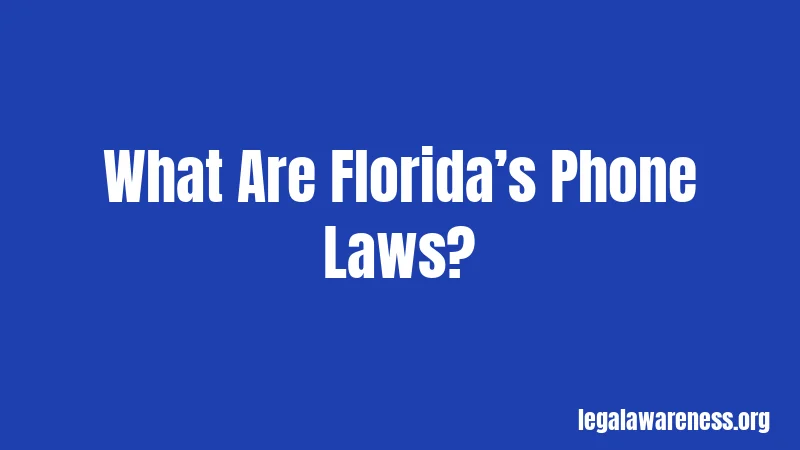Florida Phone Laws in 2026: Don’t Let a Text Cost You Big
Most people have no idea how serious Florida’s phone laws actually are. You could be breaking the law right now without realizing it. The good news? It’s pretty easy to stay compliant once you understand the rules.
Florida doesn’t mess around when it comes to distracted driving. The state has some of the strictest phone laws in the country. Whether you’re commuting to work or heading to the beach, you need to know what you can and can’t do behind the wheel.
What Are Florida’s Phone Laws?

Florida has two main phone laws that apply to drivers. They’re designed to reduce accidents caused by distracted driving. The first law bans texting while driving for all drivers. The second restricts handheld phone use for younger drivers.
Think of it like this: the state’s goal is to keep everyone’s eyes on the road, not on a screen. And honestly? That makes sense.
Florida’s Texting While Driving Ban
Texting while driving is illegal in Florida. Period. This means you can’t send text messages, instant messages, emails, or any other written communication while operating a vehicle.
Here’s what counts as texting: sending a text message, reading a text message, composing an email, or using any messaging app. Even reading a text that just came in can get you a ticket. If you’re checking your phone for any written communication, you’re breaking the law.
Now, here’s where it gets specific. Florida distinguishes between reading, writing, and sending messages. But honestly? All of them are illegal. You could get pulled over and cited for any of these actions.
Who Does This Law Apply To?

This is important: Florida’s texting ban applies to everyone. That includes teenagers, adults, and seniors. There’s no age exception. If you’re driving and you touch your phone to send or read a text, you can get a ticket.
The law also applies to all types of vehicles. Car, truck, motorcycle, it doesn’t matter. If you’re behind the wheel and operating a motor vehicle on a public road, the texting ban applies to you.
Wait, but what about traffic lights? You’re not technically driving while stopped, right? Well, Florida law considers your vehicle “operating” even when you’re stopped at a red light. So texting at a stop sign or traffic light is also illegal.
Florida’s Handheld Phone Restriction
Florida also has a law that restricts handheld phone use while driving. But this one’s only for drivers under 18 years old. Okay, so if you’re a young driver in Florida, you can’t use a handheld phone for any purpose while driving.
This includes talking on the phone, even hands-free calling. Wait, that’s not right. Let me clarify: hands-free calling is actually allowed. The ban is specifically on handheld phones. So if you’re under 18, you need to use hands-free technology like Bluetooth, speaker phone, or a car’s built-in system.
Young drivers also can’t text, which they’re already covered under the general texting law. But the handheld restriction is stricter for this age group.
Exceptions to the Rules

Not everything involving your phone while driving is illegal in Florida. There are actually a few important exceptions you should know about. Stay with me here.
You can use your phone to call emergency services like 911. Making that call doesn’t violate the law. This is one of the few times you can touch your phone while driving.
You can also use GPS navigation apps like Google Maps or Apple Maps while your phone is mounted on your dashboard. But here’s the catch: you can only interact with it before you start driving or at red lights. Once you’re moving, you need to follow your directions without touching the phone.
Another exception: if you’re a professional driver (like an Uber driver) or you work for a company that requires phone use while driving, there might be limited exceptions. But these exceptions are rare and very specific.
What About Hands-Free Calling?
This confuses a lot of people. Let’s clear it up. For drivers 18 and older, hands-free phone calls are legal. You can use Bluetooth, speaker phone, or any system that lets you talk without holding the phone.
The law specifically bans handheld use for young drivers. Adults can talk on the phone hands-free while driving. You’re not technically holding a handheld device, so it’s permitted.
But here’s the thing: even though it’s legal, it’s still distracting. Research shows that phone conversations take your mental focus off the road. So just because you can do it doesn’t mean you should. Stay focused on driving.
The Penalties for Breaking Florida’s Phone Laws
Let’s talk about what happens when you get caught. The penalties can be pretty steep, honestly.
For a first texting while driving violation, you’re looking at a minimum fine of $30. For a second violation within five years, the fine jumps to $60. A third or subsequent violation within five years costs $100.
These are just the base fines. Add court costs on top of that, and your total could easily be $200 or more. Plus, some jurisdictions might add additional fees.
Here’s something important: texting while driving is a primary offense in Florida. That means a police officer can pull you over just for texting. They don’t need another reason. This is different from other states where phone use is a secondary offense.
If you’re a young driver (under 18) and you violate the handheld phone law, you face a $30 fine for a first offense. A second offense costs $60. A third offense is $100.
Can You Get Points on Your License?
Good question, and this is where it gets serious. Texting while driving violations don’t automatically add points to your driving record. However, if your violation also results in a crash or other traffic violation, you could face additional charges that do add points.
A crash caused by distracted driving could result in charges beyond the texting violation. You might face careless driving charges, which do add points. So while the texting violation alone might not add points, the consequences of texting could definitely impact your record.
Recent Changes to Florida’s Phone Laws
Florida’s phone laws have been in place for a while now. The texting ban started in 2013. The handheld restriction for young drivers came into effect later. As of 2026, these laws remain unchanged.
However, there’s been ongoing discussion about stricter laws. Some lawmakers have proposed banning handheld phone use for all drivers, not just young drivers. These proposals haven’t passed yet, but they’re worth keeping an eye on. The laws could get stricter in the future.
How to Stay Compliant with Florida Phone Laws
Okay, here’s the practical stuff. How do you actually follow these laws while still staying connected? It’s easier than you think.
First, put your phone away before you drive. Keep it in your pocket, purse, or a bag. Out of sight, out of mind. If you’re tempted to check it, you can’t if it’s not accessible.
Second, use hands-free technology. Connect your phone to your car’s Bluetooth system before you drive. Then you can take calls safely without touching your phone.
Third, let people know you’re driving. Send an auto-reply text before you hit the road. Services like Uber have features that automatically tell people you’re driving. Your friends will understand.
Fourth, pull over if you need to use your phone. If you absolutely must text or read a message, find a safe place to park. Then you can take care of it without breaking the law or endangering anyone.
Fifth, use GPS navigation apps before you drive. Input your destination before you leave. You won’t need to touch your phone during the trip.
What If Someone Is Texting While Driving?
You can report dangerous drivers to police. If you see someone texting while driving, you can call the non-emergency police line and provide the license plate number and location.
Florida also has the “See Say” program in some areas. You can report distracted driving through this program. But honestly, your best bet is just calling local law enforcement.
Special Situations in Florida
What about while you’re parked? Great question. If your engine is running and you’re technically “operating” the vehicle, the law applies. This includes sitting in a parking lot with the engine on or waiting at a drive-through.
Once you’ve turned off the engine, you’re no longer operating the vehicle. You can text all you want. But the moment you turn the key or press the start button, you need to put the phone away.
What if you’re the passenger? Passengers can text and use phones freely. The law is about distracted driving, and passengers aren’t driving. So if you’re not behind the wheel, you can use your phone without any legal restrictions.
Frequently Asked Questions
Can I look at my GPS while driving?
Yes, but only if it’s mounted on your dashboard. You can’t hold it in your hand. And once you’re driving, you should follow the directions without looking at the phone. Input your destination before you start moving.
Does Florida have a hands-free law?
Not for adults. Drivers 18 and older can use handheld phones for hands-free calling. Drivers under 18 can’t use handheld phones at all, but hands-free is allowed.
What if I’m at a red light?
The texting law applies even at red lights. Your vehicle is still “operating.” So you can’t text. However, you could technically pick up your phone to answer a hands-free call if you wanted to (though it’s safer to let it go to voicemail).
Can I get my ticket dismissed?
You can fight the ticket in traffic court. You’ll need to prove the officer was wrong or that an exception applies. Many tickets hold up in court, but it’s possible. Consider consulting a traffic attorney.
Are there any apps that block texting while driving?
Yes, several apps can lock your phone while you’re driving. Apps like Life360, DriveMode, and InDrive automatically prevent texting when the phone detects driving speeds. Some cars have built-in systems too.
What counts as texting?
Any written communication. Text messages, emails, social media messages, instant messages, dating apps, all of it. If it involves reading or writing something on your phone, it counts.
Can I use my smartwatch?
Smartwatches are a gray area. Technically, they’re not handheld devices. But if using your smartwatch distracts you or takes your attention off the road, you could face additional charges. It’s probably safer to avoid them while driving.
Final Thoughts
Florida takes distracted driving seriously, and for good reason. Texting while driving kills people. The laws exist to protect you, your passengers, and everyone else on the road.
Now you understand the rules. You know what’s legal and what isn’t. You know the penalties. Most importantly, you know how to stay safe and compliant. Follow these guidelines, stay focused on the road, and keep your phone away while driving.
The few minutes you save by texting aren’t worth the fine, the points, or the risk of causing an accident. Stay safe out there.
References
Florida Statute 316.305 – Texting While Driving
Florida DMV – Distracted Driving Laws
Florida Highway Safety and Motor Vehicles Official Website
Florida Statute 316.614 – Handheld Device Restrictions for Drivers Under 18
National Highway Traffic Safety Administration – Distracted Driving
